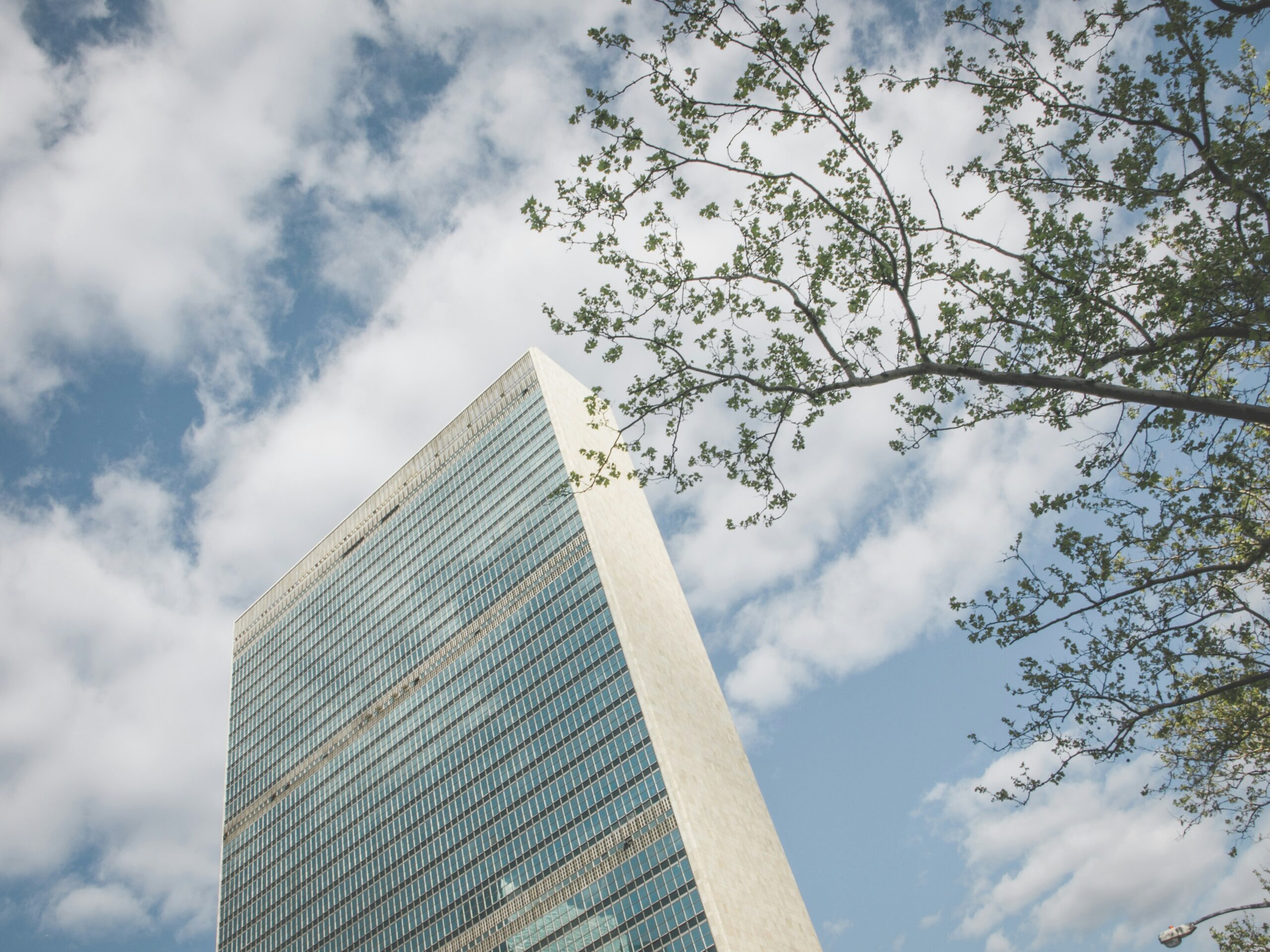Article 51 and the Invocation of State Rights to Inherent Self-Defence
Article 51 of the United Nations Charter is a critical provision that, in recent times, has been invoked by various states and state entities to exercise their inherent right to self-defence if an armed attack occurs against them. The exact wording in the United Nations Charter is:
Article 51: Nothing in the present Charter shall impair the inherent right of individual or collective self-defence if an armed attack occurs against a Member of the United Nations, until the United Nations Security Council[1]has taken measures necessary to maintain international peace and security. Measures taken by Members in the exercise of this right of self-defence shall be immediately reported to the Security Council and shall not in any way affect the authority and responsibility of the Security Council under the present Charter to take at any time such action as it deems necessary to maintain or restore international peace and security.[2]
While Article 51 of the UN Charter aims to provide states and state entities with the means to defend themselves, this paper will explore how some have used or misused this provision. It will also examine how the UN, the UN Security Council, and various UN Secretary-Generals have responded to such invocations, assessing the responsibilities of states to adhere to the provisions and limitations outlined by the UN and various rulings from the International Court of Justice (ICJ) and International Criminal Court (ICC).
To discuss the misuses of Article 51, it is essential first to address instances when Article 51 was invoked under legitimate circumstances. One such instance was during the Gulf War between the United States and Iraq in 1991. This was analysed by Yoxall in 1991 discusses how the United States, under President Bush, invoked Article 51 confidently, citing its provisions for self-defence and collective security.[3]
Yoxall elaborates on the support of the United Nations Security Council and the various resolutions passed by the United Nations Security Council, including Resolution 660, which condemned Iraq’s invasion of Kuwait.[4]Subsequent resolutions, such as Resolution 661[5], which imposed a trade embargo on Iraq, and Resolution 662[6], which nullified Iraq’s annexation of Kuwait, were crucial in legitimizing the coalition’s actions. These resolutions demonstrated the unified mobilization of the Security Council and its ability to work within its regulatory confines, ultimately enabling military intervention by the United States, Great Britain, and France
These subsequent United Nations Security Council resolutions that were passed such as resolutions 667[7],669[8],670[9], 674[10],677[11] and 678[12] were proof of the urgency and the united mobilization of the United Nations Security Council. This was also proof of a situation where the system is allowed to proceed and work within the confines of the regulation that it is allowed to have but the United Nations Security Council was able to pass sanctions limitations and allow for eventual military intervention.
While the resolutions passed were still not as binding, the act of the King Fahd of Saudi Arabia requesting for military assistance was able to allow United States, Great Britain and France’s intervention on Iraq’s military movement was what allowed them to repel the Iraqi forces.
Contentious Use of Article 51 by Israel
Israel’s invocation of Article 51 has been particularly contentious, especially regarding the principles of necessity and proportionality, which are essential components of international law and the UN Charter. It is also important to note that the concept of necessity has been clearly defined under the Caroline formulation which is the main predecessor of how necessity has been defined in which “it will be for that Government to show a necessity of self-defence, instant, overwhelming, leaving no choice of means, and no moment for deliberation” and the action must not be “unreasonable or excessive, since the act, justified by the necessity of self-defence, must be limited by that necessity, and kept clearly within it.”[13]
Israel has justified military actions against civilian properties and protected entities, such as UN schools, hospitals, places of worship, and refugee camps, by claiming the presence of Hamas military groups within these locations even though under the UN office of special representative of the secretary – general for children and armed conflict these locations “are protected civilian objects” [14] and thus attacking these facilities can be seen as “one of the six grave violations identified and condemned by the UN Security Council”.[15]
The proportionality claim of Israel’s actions often comes under severe scrutiny. The concept of proportionality in self-defence, as articulated under Article 51, requires that the defensive measures taken in response to an armed attack must be commensurate with the threat posed. “The scale of the bombardment and its impact on civilians raises questions about Israel’s adherence to proportionality,” Iain Overton, executive director of the London-based Action on Armed Violence, which conducts research and advocacy on armed violence against civilians told Al Jazeera.[16] The deliberate targeting of civilian infrastructure and the resulting high civilian casualties have led many to question whether Israel’s responses meet this criterion.
The attack on October 7th 2023[17], which Israel used to justify a series of subsequent military actions, serves as a critical case study. While Israel asserts that its actions are preventive measures against future threats from Hamas, the scale and intensity of its military response have raised significant legal and ethical questions. The international community, through the UN Security Council, has repeatedly condemned these actions, emphasizing that the principles of necessity and proportionality must guide all self-defence measures.
“The right to self-defence can be invoked when the state is threatened by another state, which is not the case,” Francesca Albanese, UN special rapporteur on human rights in the occupied Palestinian territories, said in an address to the Australian Press Club[18]. In the same address, Albanese has also said “Israel does not claim it has been threatened by another state. It has been threatened by an armed group within an occupied territory. It cannot claim the right of self-defence against a threat that emanates from a territory it occupies, from a territory kept under belligerent occupation,(…).”[19] This is in direct reference to the 2004 ICJ advisory opinion where the ICJ issued that the Israel’s building of a barrier in the occupied Palestinian territory is illegal and said construction must stop immediately and Israel should make reparations for any damage caused.[20]Elizabeth Wilmshurst argues in 2005 that the advisory opinion also reflects the obvious point that unless an attack is directed from outside territory under the control of the defending state the question of self-defence in the sense of Article 51 does not normally arise especially in the case of the attack of October 7th.[21]
The repeated violations of international humanitarian law (IHL) by targeting protected entities have not only undermined the legitimacy of Israel’s self-defence claims but have also strained its relations with various UN bodies and international organizations. This situation illustrates the complexities and challenges in applying Article 51, particularly when actions taken in the name of self-defence result in extensive collateral damage and humanitarian crises.
Comparing Israel’s use of Article 51 with that of US use of Article 51 in the Iraqi exemplifies the challenges and limitations of invoking self-defence under international law.
Both incidents highlight the inherent limits of Article 51. The Security Council’s role is crucial in determining the legitimacy of self-defence claims and the ultimate authority and oversight rest with the UN Security Council to prevent unilateral interpretations of self-defence that can lead to unlawful interventions or conflict fought in the name of “self-defence”
The invocation of Article 51 must be scrutinized to ensure compliance with international law. The Security Council’s oversight is especially vital in maintaining the integrity of self-defence claims under the UN Charter.
[1] Article 23,” in Charter of the United Nations and Statute of the International Court of Justice (San Francisco: United Nations, 1945), 7-8.
[2] “Article 51,” in Charter of the United Nations and Statute of the International Court of Justice (San Francisco: United Nations, 1945), 9.
[3] Thomas Yoxall, “Iraq and Article 51: A Correct Use of Limited Authority,” 25 International Lawyer 967 (1991).
[4] Thomas Yoxall, “Iraq and Article 51: A Correct Use of Limited Authority,” 25 International Lawyer 967 (1991).
[5] U.N. Security Council. Resolution 661. U.N. Doc. S/RES/661 (Aug. 6, 1990).
[6] U.N. Security Council. Resolution 662. U.N. Doc. S/RES/662 (Aug. 9, 1990).
[7] U.N. Security Council, Resolution 667, U.N. Doc. S/RES/667 (Sept. 16, 1990).
[8] U.N. Security Council, Resolution 669, U.N. Doc. S/RES/669 (Sept. 24, 1990).
[9] U.N. Security Council, Resolution 670, U.N. Doc. S/RES/670 (Sept. 25, 1990).
[10] United Nations Security Council. Resolution 674. U.N. Doc. S/RES/674 (Oct. 29, 1990).
[11] United Nations Security Council. Resolution 677. U.N. Doc. S/RES/677 (Nov. 28, 1990).
[12] United Nations Security Council. Resolution 678. U.N. Doc. S/RES/678 (Nov. 29, 1990).
[13] Letter dated 27 July 1842, from Daniel Webster to Lord Ashburton, Brit. & For. State Papers, Vol. XXX, 193-194 (1841-1842), extract taken from Webster’s earlier letter to Henry S. Fox dated 24 April
[14] “Attacks Against Schools,” Office of the Special Representative of the Secretary-General for Children and Armed Conflict, accessed July 16, 2024. https://childrenandarmedconflict.un.org/six-grave-violations/attacks-against-schools/.
[15] “Attacks Against Schools,” Office of the Special Representative of the Secretary-General for Children and Armed Conflict, accessed July 16, 2024. https://childrenandarmedconflict.un.org/six-grave-violations/attacks-against-schools/.
[16] “Does Israel Have the Right to Self-Defence in Gaza?” Al Jazeera, 2024, July 23. https://www.aljazeera.com/news/2023/11/17/does-israel-have-the-right-to-self-defence-in-gaza. ↩
[17] “October 7 Crimes Against Humanity, War Crimes by Hamas-Led Groups,” Human Rights Watch, July 17, 2024, https://www.hrw.org/news/2024/07/17/october-7-crimes-against-humanity-war-crimes-hamas-led-groups.
[18] “Does Israel Have the Right to Self-Defence in Gaza?” Al Jazeera, 2024, July 23. https://www.aljazeera.com/news/2023/11/17/does-israel-have-the-right-to-self-defence-in-gaza. ↩
[19] “Does Israel Have the Right to Self-Defence in Gaza?” Al Jazeera, 2024, July 23. https://www.aljazeera.com/news/2023/11/17/does-israel-have-the-right-to-self-defence-in-gaza. ↩
[20] “International Court of Justice finds Israeli barrier in Palestinian territory is illegal”
UN News, July 26, 2004. https://news.un.org/en/story/2004/07/108912.
[21] Elizabeth Wilmshurst, “Principles of International Law on the Use of Force by States in Self-Defence,” ILP WP 05/01, Chatam House, October 2005.
Photo by Tomas Eidsvold on Unsplash

